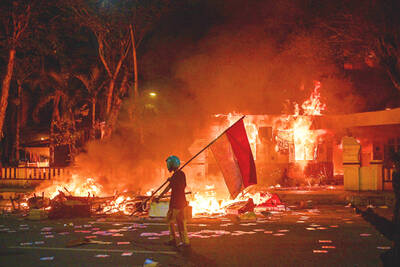The UN Security Council imposed sanctions on Eritrea on Wednesday because of aid that council members say the Horn of Africa country has given to Islamist insurgents in Somalia.
A resolution supported by 13 of the 15 council members slapped an embargo on arms imports and exports by Eritrea, as well as asset freezes and travel bans on individuals and firms to be designated by an existing sanctions committee. Those hit would include members of the country’s leadership, it said.
The US and other nations accuse Eritrea of supplying al Shabaab rebels with funds and arms as they fight to topple a fragile UN-backed transitional government in Somalia, a state that has been virtually lawless for 18 years. Eritrea has repeatedly denied the allegation.
Libya, which has no veto in the council, voted against the resolution, while veto-holder China abstained.
The resolution demanded that Eritrea “cease arming, training, and equipping armed groups and their members including al Shabaab, that aim to destabilize the region” and also resolve a border dispute with Djibouti.
It said “Eritrea’s actions undermining peace and reconciliation in Somalia as well as the dispute between Djibouti and Eritrea constitute a threat to peace and international security.”
It was the first time UN sanctions had been imposed on Eritrea, a partly Muslim, partly Christian state that won independence from Ethiopia in 1993.
The last country to suffer UN sanctions for the first time was Iran in December 2006.
Diplomats said Uganda, which has peacekeeping troops in Somalia that have been targeted by al Shabaab, drafted the resolution after the African Union (AU) called on the council in May to punish Eritrea over its role in Somalia.
But Eritrea charged that its true author was the US.
Eritrean UN Ambassador Araya Desta described the resolution as “shameful” and told reporters it was based “on fabricated lies, mainly concocted by the Ethiopian regime and the US administration.”
Ethiopia invaded Somalia in 2006 with tacit US backing to rout an Islamic courts movement from Mogadishu. It withdrew its troops earlier this year.
“We have never supported any insurgents or any opposition in Somalia,” Desta said. “We don’t want to take sides in Somalia. Somalis are our brothers.”
Libya opposed sanctions against any African country and believed the issue should have been postponed until after an AU summit next month, he said.
Chinese Ambassador Zhang Yesui (張業遂) said sanctions “should not replace diplomatic efforts to resolve disputes through dialogue and negotiations.”
But British Ambassador Mark Lyall Grant said Eritrea had merited sanctions for violating a UN arms ban on Somalia.

Australia has announced an agreement with the tiny Pacific nation Nauru enabling it to send hundreds of immigrants to the barren island. The deal affects more than 220 immigrants in Australia, including some convicted of serious crimes. Australian Minister of Home Affairs Tony Burke signed the memorandum of understanding on a visit to Nauru, the government said in a statement on Friday. “It contains undertakings for the proper treatment and long-term residence of people who have no legal right to stay in Australia, to be received in Nauru,” it said. “Australia will provide funding to underpin this arrangement and support Nauru’s long-term economic

ANGER: Unrest worsened after a taxi driver was killed by a police vehicle on Thursday, as protesters set alight government buildings across the nation Protests worsened overnight across major cities of Indonesia, far beyond the capital, Jakarta, as demonstrators defied Indonesian President Prabowo Subianto’s call for calm. The most serious unrest was seen in the eastern city of Makassar, while protests also unfolded in Bandung, Surabaya, Solo and Yogyakarta. By yesterday morning, crowds had dispersed in Jakarta. Troops patrolled the streets with tactical vehicles and helped civilians clear trash, although smoke was still rising in various protest sites. Three people died and five were injured in Makassar when protesters set fire to the regional parliament building during a plenary session on Friday evening, according to

‘NEO-NAZIS’: A minister described the rally as ‘spreading hate’ and ‘dividing our communities,’ adding that it had been organized and promoted by far-right groups Thousands of Australians joined anti-immigration rallies across the country yesterday that the center-left government condemned, saying they sought to spread hate and were linked to neo-Nazis. “March for Australia” rallies against immigration were held in Sydney, and other state capitals and regional centers, according to the group’s Web site. “Mass migration has torn at the bonds that held our communities together,” the Web site said. The group posted on X on Saturday that the rallies aimed to do “what the mainstream politicians never have the courage to do: demand an end to mass immigration.” The group also said it was concerned about culture,

CRACKDOWN: The Indonesian president vowed to clamp down on ‘treason and terrorism,’ while acceding to some protest demands to revoke lawmaker benefits Protests in Indonesia over rising living costs and inequality intensified overnight, prompting Indonesian President Prabowo Subianto to cancel a planned trip to China, while demonstrators reportedly targeted the homes of the finance minister and several lawmakers. Rioters entered Indonesian Minister of Finance Sri Mulyani Indrawati’s residence near Jakarta early yesterday, but were repelled by armed forces personnel, Kompas reported. Items were taken from the homes of lawmaker Ahmad Sahroni and two others, according to Detik.com. The reports of looting could not be independently verified, and the finance ministry has not responded to requests for comment. The protests were sparked by outrage over